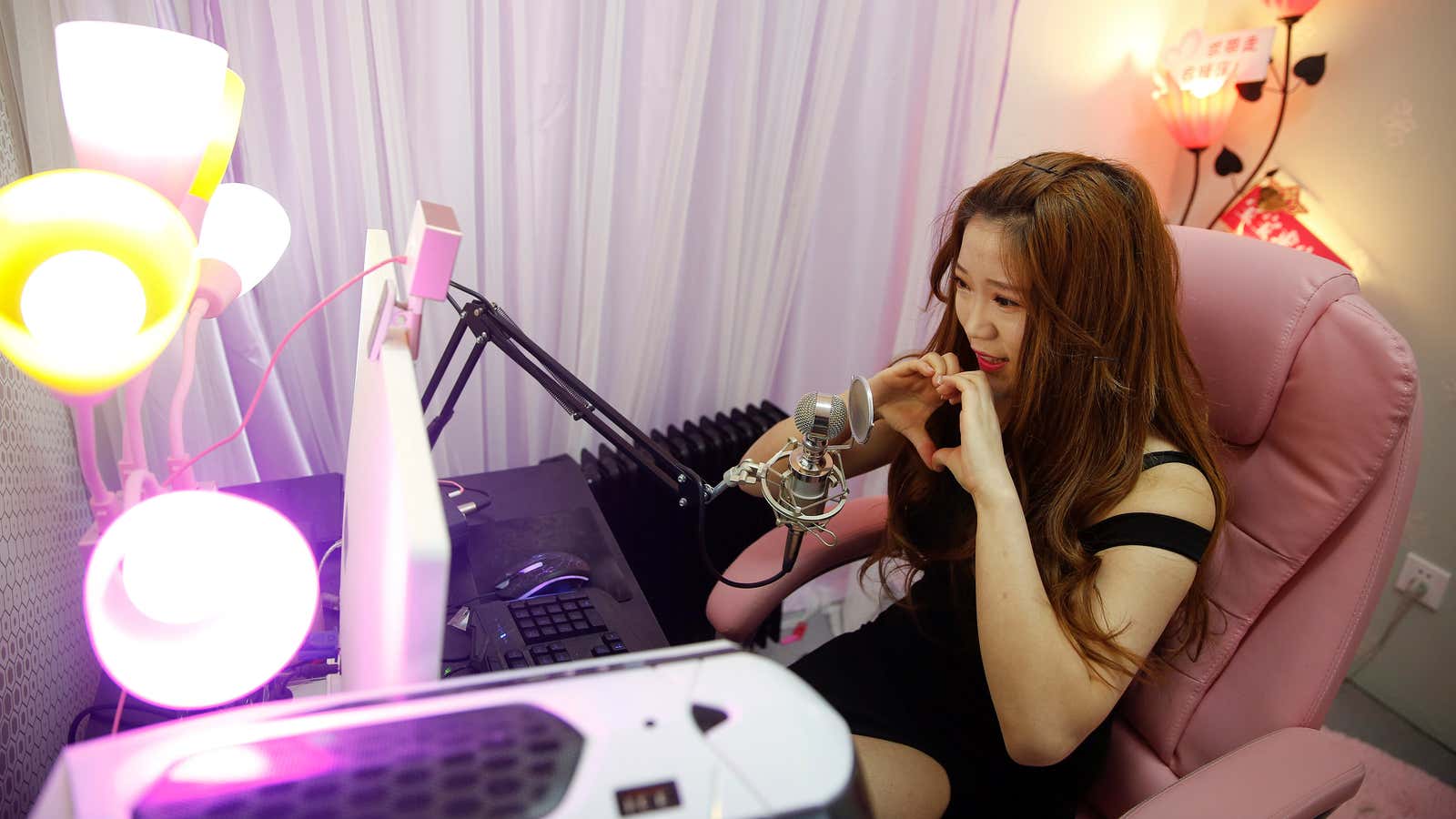For China’s livestreaming craze, the party is over it seems—now that the Communist party has arrived.
On Thursday, China’s State Administration of Press, Publication, Radio, Film and Television (SAPPRFT), a branch of China’s state council that oversees the media industry, published a notice (link in Chinese) that unlicensed providers of “audio-visual” services must cease related activities until they obtain the required permissions. The directive singled out three internet companies, the largest of which was Weibo–the Twitter-esque social media platform, which has recently jumped on the livestreaming bandwagon to much success.
Sina, Weibo’s parent company, immediately took a hit—its stock price dropped 5.9% between its June 21 close and its June 22 open
As is often the case with such government directives, ambiguities abound. As Jefferies analyst Karen Chan points out in a research note, Weibo’s video content is technically hosted by Yixia Technologies, a livestreaming holding company of sorts, which already has the necessary Internet Audio-Visual Program Transmission License. Around 10am Asia time, Weibo’s livestreaming services remained up and running.
But there’s the word of the law, and spirit of the law. By publicly targeting one of China’s largest internet companies, the government is signaling that its ongoing crackdown on livestreaming apps will only grow more intense, and could very well bring some businesses to their knees.
Livestreaming has blown up in China, as ordinary people amass massive followings (and sometimes incomes) by broadcasting themselves eating, chatting, or doing any number of stunts to please audiences. As of last October, there were an estimated 200 livestreaming apps on the market. Jefferies estimates livestreaming in China will be a $6.4 billion industry by 2020.
Yet the government has kept a watchful eye over livestreaming companies. That’s because live video is more difficult to censor than static text. Below is a roundup of crackdowns and regulations the government has imposed since early 2016, and some ways companies have responded:
April 2016: China’s Ministry of Culture announced it will launch an “investigation” into China’s major livestreaming companies to determine whether they “harm social morality.”
April 2016: In likely anticipation of a further crackdown, 20 internet companies including Sina, YY, and Baidu collectively pledge (link in Chinese) to require livestreaming personalities to register using their real names and personal ID numbers, add watermarks to their videos, retain videos online for 15 days, and monitor content around the clock.
May 2016: An article published by Chinese news site The Paper reports on a group of censors working at an unnamed livestreaming site, and quotes them stating that videos showing women eating bananas (link in Chinese) in a sexually suggestive manner must be removed.
August 2016: The Cyberspace Administration of China (CAC), the agency that oversees China’s internet censorship, convened a meeting (link in Chinese) in Beijing with internet media companies calling for round-the-clock monitoring of livestreaming videos, as well as censorship of “bullet screen” comments common on the platforms.
September 2016: SAPPRFT announces that all online livestreaming platforms must obtain an “Internet Audio-Visual Program Transmission License” in order to operate legally, while those that do not have it risk getting shut down.
December 2016: CAC implements a formal set of regulations (link in Chinese) for livestreaming platforms, stating that they must not “harm national security, damage social stability, disturb societal order, violate the rights of others, or broadcast obscene or erotic activities.” The rules require livestreaming personalities to register using their real names, ID numbers, phone numbers, and credit information. They also require platforms to maintain a blacklist of personalities that violate rules and prevent blacklisted names from registering new accounts.
December 2016: CAC tells state media outlet Xinhua that “4,500 accounts” and “3,100 programs” have been shut down across a number of Beijing-based livestreaming sites.
April 2017: CAC shuts down 18 livestreaming apps for broadcasting “illegal content.”
May 2017: China’s Ministry of Culture shuts down an additional 10 livestreaming apps.
May 2017: As part of an ongoing inspection, authorities detained a 22-year-old livestreamer and subsequently forced her to shut down her account and placed an “administrative penalty” on Huaijiao, the platform hosting her content, after she filmed a video claiming to be staying in Beijing’s Palace Museum overnight.
Visen Liu contributed to research.
